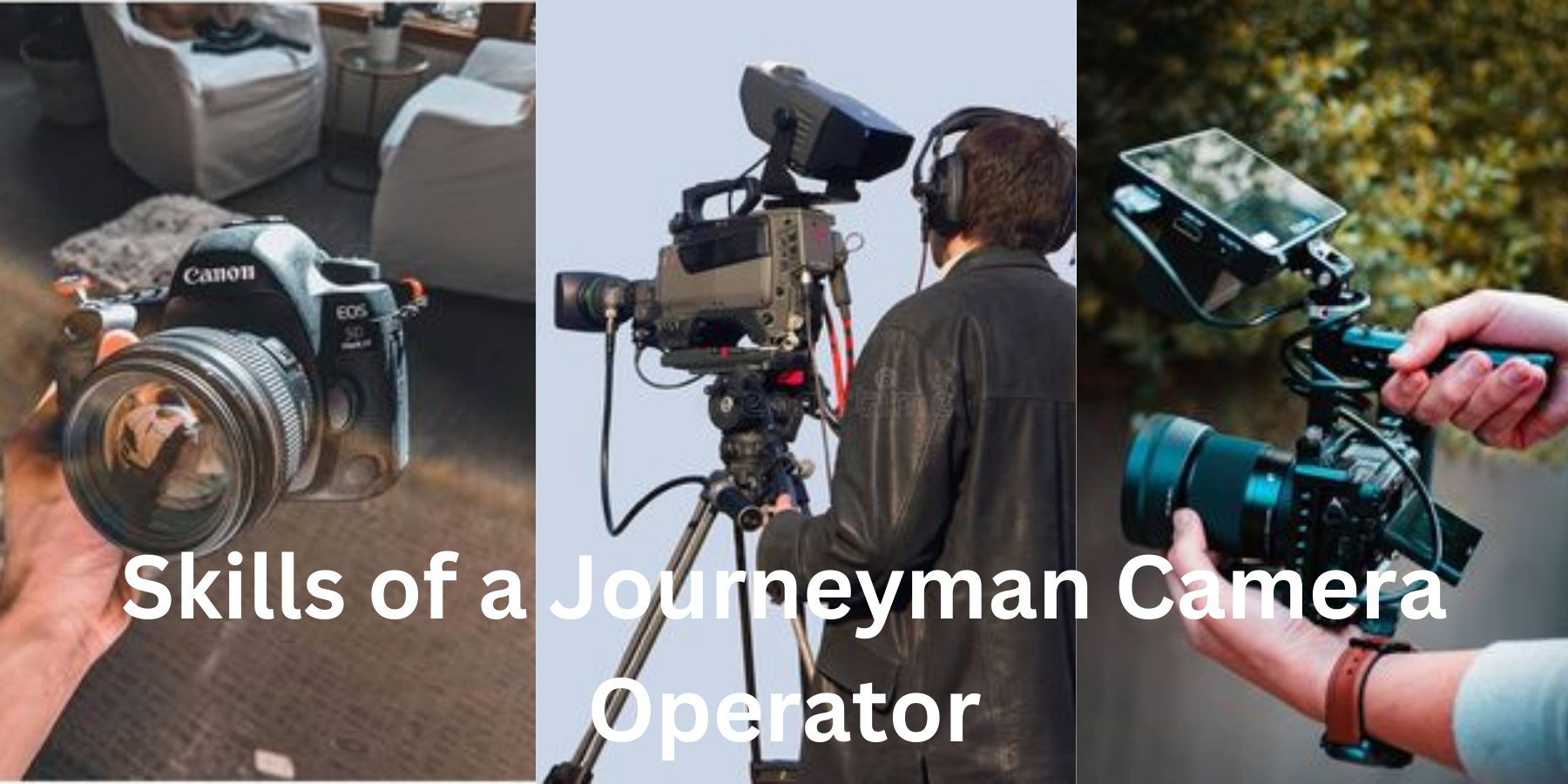TOPIC
Understanding the Role and Skills of a Journeyman Camera Operator

Have you ever wished you knew the creative mind behind the stunning camera work in your favorite programs and movies? A journeyman camera operator is useful in such a situation. They toil away at getting the picture that makes a tale come to life, and they are the unsung heroes of the visual world. The importance of journeyman camera operators in film and television productions begs the question: what precisely are they?
Historical Context
Evolution of Camera Operators
The development of motion pictures in the late 1800s marked the beginning of a new era for camera operators. The function has changed substantially throughout the years, going from using hand-cranked cameras to using very advanced digital technology. Even in the most basic of settings, the first operators had to learn how to manually adjust the focus and exposure.
Milestones in the Development of the Role
Innovations in technology have revolutionized the way cameras work over the years. Camera operators’ roles and expertise have evolved over the years due to technological advancements like as sound, color film, and digital cinematography.
Educational Pathways
Formal Education and Training
Although it isn’t necessarily required, going to film school or getting a degree in cinematography helps a lot of aspiring camera operators. Students get practical experience in addition to theoretical understanding of camera, lighting, and editing methods in these programs.
Apprenticeships and On-the-Job Training
Apprenticeships provide a great opportunity for beginners to learn from more experienced workers in a hands-on setting. The mentoring program provides a thorough grasp of the camera operator’s function by bridging the gap between theoretical knowledge and actual abilities.
Key Responsibilities
Basic Duties of a Camera Operator
On set, a journeyman camera operator is responsible for operating the various cameras and lenses to get the shot the director had in mind. Maintaining and adjusting the camera, focusing, and keeping up with the action are all part of this.
Advanced Skills and Techniques
In addition to the fundamentals, experienced camera operators are well-versed in a variety of filming methods, including handheld, crane, and dolly shots. In order to guarantee that every shot is of the greatest quality, they are experts in improvising and solving problems while filming.
Technical Proficiency
Mastery of Camera Equipment
It is essential for a journeyman camera operator to have extensive experience with a wide range of camera systems, including both analog and digital models. If you want professional-quality film, you need to know how to use all of your gear, including lenses, filters, and mounts.
Understanding of Lighting and Sound
In order to get the perfect photo, camera operators need to collaborate closely with lighting professionals. Operators may also benefit from knowing the fundamentals of sound recording in order to prevent problems like boom shadows and microphone incursions.
Creative Contributions
Visual Storytelling
Visual narrative relies heavily on camera operators. Framing, camera movement, and shot design all play a part in expressing the story’s tone and mood. When it comes to turning a screenplay into an artistic masterpiece, their labor is crucial.
Collaboration with Directors and Cinematographers
Cooperation that works is essential. The camera crew assists the directors and cinematographers in bringing their creative ideas to life on film. To pull this off as a team, you need to be fluent in film language and have great communication skills.
Work Environment
Types of Productions (Film, TV, Commercials)
Camera operators are in high demand and may be seen in a wide variety of media, from feature films and television series to advertisements and documentaries. distinct types of production call for distinct sets of abilities and approaches.
Typical Work Conditions
A lot of different things may happen in the workplace. A camera operator’s work might take them anywhere from a peaceful studio to a busy downtown street or even into the middle of nowhere. This line of work requires a high degree of versatility and flexibility.
Essential Skills
Technical Skills
A solid understanding of post-production procedures, such as editing and color correction, is essential for journeyman operators in addition to camera operation. Their level of technological expertise guarantees that the video they record may be seamlessly included into the finished product.
Soft Skills
The ability to interact with others is crucial. Important qualities include being cool under pressure, paying close attention to detail, and having patience. With these abilities, operators can better handle the ever-changing and often surprising world of film production.
Career Progression
From Novice to Journeyman
It takes a lot of time and effort to get from being a beginner to a journeyman. People get their start as camera assistants and work their way up to more challenging roles as they gain experience and credibility.
Opportunities for Advancement
Cinematographers and directors of photography are positions that journeyman camera operators may rise to with expertise. These roles provide more room for creative expression and responsibility, which in turn opens doors to higher-level employment.
Challenges and Rewards
Common Challenges Faced
Working as a camera operator isn’t always easy. It may be exhausting to work long hours, be physically demanding, and have to continually adjust to new situations. Nevertheless, the benefits often surpass the difficulties.
The Rewards of the Profession
Witnessing one’s work shown on large screens or television provides tremendous fulfillment. All the effort pays off when you get to experience the creative satisfaction and public acclaim of being a part of a successful production.
Industry Trends
Impact of Digital Technology
Technology in the digital realm is still reshaping the industry. Many technological advancements, such as high-definition cameras, drones, and virtual reality, are influencing the way camera operators do their jobs. If you want to be successful, you need to keep up with these trends.
Future Prospects
Skilled camera operators are anticipated to see an increase in demand. More possibilities than ever before exist for skilled operators because to the explosion of streaming services and the ever-increasing output of digital material.
Professional Associations
Importance of Networking
Opportunities to network, access resources, and gain insight into one’s field might be yours when one joins a professional group. The best way for operators to keep up with the latest developments in their field and find new employment prospects is to network.
Key Organizations to Join
Camera operators may further their careers by becoming members of organizations like the Society of Camera Operators (SOC) and the International Cinematographers Guild (ICG).
Case Studies
Notable Journeyman Camera Operators
For ideas and motivation, look into the lives and work of famous journeyman camera operators. These experts have contributed to the development of the business via their work on blockbuster films and television series.
Their Contributions to the Industry
Their innovative techniques and dedication have set new standards in cinematography, demonstrating the significant impact journeyman camera operators can have on the visual arts.
Tips for Aspiring Camera Operators
Building a Portfolio
Aspiring camera operators must have a solid portfolio that displays a variety of tasks and abilities. A portfolio is a visual résumé that showcases your skills and work history.
Gaining Practical Experience
Practical experience is priceless. You may get the hands-on experience you need to make it in this competitive industry by working on student films, independent productions, and crews.
Conclusion
To sum up, being a journeyman camera operator is an exciting and demanding job. The technical expertise and artistic vision of these individuals are essential to the cinema and television industries, as they bring tales to life. Becoming a camera operator is a fantastic career choice for those who are enthusiastic about visual storytelling.
FAQs
What is the average salary of a journeyman camera operator?
The usual yearly income for a journeyman camera operator is from $40,000 to $70,000, however it does depend on factors like experience and location.
How long does it take to become a journeyman camera operator?
The typical path to become a journeyman camera operator often involves an apprenticeship or entry-level work followed by many years of experience.
What are the key qualities of a successful camera operator?
To succeed, you need to be technically proficient, creative, communicative, detail-oriented, and able to work well under pressure.
Are there any certifications required?
Certifications from professional organizations may boost reputation and employment possibilities, but they are not always necessary.
How can one stay updated with the latest industry trends?
One of the best ways to keep up with the newest developments in your field is to join a professional organization, go to seminars, and read up on relevant journals and forums.

TOPIC
Where to Buy the YELL51X-OUZ4: A Comprehensive Guide

The YELL51X-OUZ4 is a highly sought-after model known for its advanced features and robust performance. Whether you’re a tech enthusiast or a professional looking for a reliable device, knowing where to purchase this model is crucial.
Official Website: The Safest Option
One of the best places to purchase the YELL51X-OUZ4 is directly from the manufacturer’s official website. Buying from the official site ensures that you receive an authentic product with the full manufacturer’s warranty and support. Additionally, the official website often offers exclusive deals, early access to new models, and bundled accessories that you might not find elsewhere.
- Benefits: Authentic product, comprehensive warranty, customer support, exclusive deals.
- Considerations: Prices may be higher than other options, and shipping times can vary.
Authorized Retailers: Trusted and Reliable
Purchasing from authorized retailers is another safe option. These retailers are vetted by the manufacturer, ensuring that the products they sell are genuine and come with the standard warranty. Authorized retailers include both physical stores and online platforms.
- Nationwide Chains: Stores like Best Buy and Walmart are authorized to sell the YELL51X-OUZ4. They often provide competitive pricing, in-store pickup options, and convenient return policies.
- Local Electronics Stores: Smaller, local electronics stores may also be authorized retailers. These stores offer the advantage of in-person shopping, allowing you to see the product before purchasing.
- Benefits: Access to authentic products, warranty, and after-sales support.
- Considerations: Limited availability depending on location, potential for higher prices compared to online marketplaces.
Online Marketplaces: Convenience and Variety
For those who prefer shopping online, online marketplaces like Amazon and eBay offer a wide range of options for purchasing the YELL51X-OUZ4. These platforms provide the convenience of shopping from home, along with customer reviews to help guide your decision.
- Amazon: Amazon is a popular choice due to its vast selection, customer reviews, and flexible shipping options. It also offers a robust return policy, making it a safe option for online shoppers.
- eBay: eBay can be a good source for both new and used YELL51X-OUZ4 models. However, it’s important to check seller ratings and product descriptions carefully to avoid counterfeit products.
- Benefits: Wide selection, customer reviews, competitive pricing.
- Considerations: Risk of counterfeit products, varying levels of customer service depending on the seller.
Second-Hand Options: Cost-Effective Alternatives
For those on a budget, purchasing a second-hand YELL51X-OUZ4 can be a viable option. Platforms like Craigslist and Facebook Marketplace allow for peer-to-peer transactions, where you might find used or refurbished models at lower prices.
- Certified Refurbished: Some retailers and online platforms offer certified refurbished YELL51X-OUZ4 models. These devices have been restored to like-new condition and come with a limited warranty.
- Peer-to-Peer Marketplaces: Buying directly from individuals can result in significant savings. However, it’s important to exercise caution, verify the product’s condition, and meet in safe, public locations.
- Benefits: Lower prices, potential for good deals.
- Considerations: Risk of buying defective or counterfeit products, limited warranty, and no return policy.
Price Comparisons: Getting the Best Deal
Before making a purchase, it’s wise to compare prices across different platforms. The YELL51X-OUZ4 typically ranges between $500 to $700, depending on the seller and the condition of the model.
- Seasonal Sales: Keep an eye out for discounts during holiday seasons or sales events like Black Friday. These sales can offer substantial savings, making it the best time to purchase.
- Discounts and Deals: Check online marketplaces for ongoing deals and discounts. Sometimes, retailers offer promotions that can significantly lower the price.
Warranty and Support: Ensuring Peace of Mind
When purchasing the YELL51X-OUZ4, it’s crucial to consider warranty and customer support. Ensuring your purchase comes with a warranty protects you against manufacturing defects and offers peace of mind.
- Understanding Warranties: Verify that your purchase includes a warranty that covers parts and labor. This is especially important if you’re buying from online marketplaces or second-hand sources.
- Customer Support: Opt for sellers known for excellent customer support. This is vital for resolving any issues that may arise post-purchase.
Conclusion: Making an Informed Purchase
In summary, of Where to Buy the YELL51X-OUZ4: A Comprehensive Guide the YELL51X-OUZ4 is available from a variety of sources, each with its own set of advantages and considerations. Whether you choose to buy directly from the official website, through authorized retailers, or online marketplaces, it’s essential to do your research, compare prices, and ensure you’re buying from a reputable source. By taking these steps, you’ll be able to enjoy the full benefits of the YELL51X-OUZ4 and make a purchase you can feel confident about.

